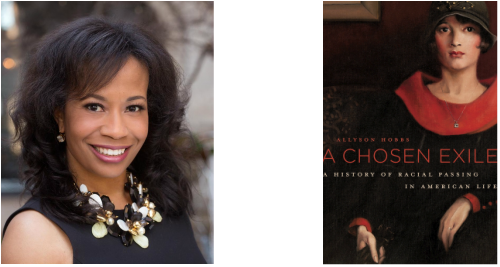What Matters to Me & Why – Allyson Hobbs
Stanford University
Common Room
Center for Inter-Religious Community Learning and Experiences (CIRCLE) at Old Union, 3rd Floor
Stanford, California
Wednesday, 2016-02-17, 12:00 PST (Local Time)

Allyson Hobbs
Sponsored by: Office for Religious Life
The purpose of What Matters to Me and Why is to encourage reflection within the Stanford community on matters of personal values, beliefs, and motivations in order to better understand the lives and inspirations of those who shape the University.
Allyson Hobbs, Assistant Professor of History
Allyson Hobbs is an Assistant Professor in the History Department at Stanford. She graduated magna cum laude from Harvard University and she received a Ph.D. with distinction from the University of Chicago. She has received fellowships from the Ford Foundation, the Clayman Institute for Gender Research, and the Center for the Comparative Study of Race and Ethnicity at Stanford.
Allyson’s first book, A Chosen Exile: A History of Racial Passing in American Life, published by Harvard University Press in 2014, examines the phenomenon of racial passing in the United States from the late eighteenth century to the present. A Chosen Exile won two prizes from the Organization of American Historians: the Frederick Jackson Turner Prize for best first book in American history and the Lawrence Levine Prize for best book in American cultural history.
A Chosen Exile has been reviewed in the New York Times Book Review, the San Francisco Chronicle, Harper’s, the Los Angeles Review of Books, and the Boston Globe. The book was selected as a New York Times Book Review Editor’s Choice, a “Best Book of 2014” by the San Francisco Chronicle, and a “Book of the Week” by the Times Higher Education in London. The Root named A Chosen Exile as one of the “Best 15 Nonfiction Books by Black Authors in 2014.”
Allyson teaches courses on American identity, African American history, African American women’s history, and twentieth century American history and culture. She has won numerous teaching awards including the Phi Beta Kappa Teaching Prize, the Graves Award in the Humanities, and the St. Clair Drake Teaching Award.
Allyson is a contributing writer to the New Yorker.com and her work has also been featured on cnn.com, slate.com, and in the New York Times, Los Angeles Times, The Chronicle of Higher Education, The National Review, and the Christian Science Monitor.
For more information, click here.



